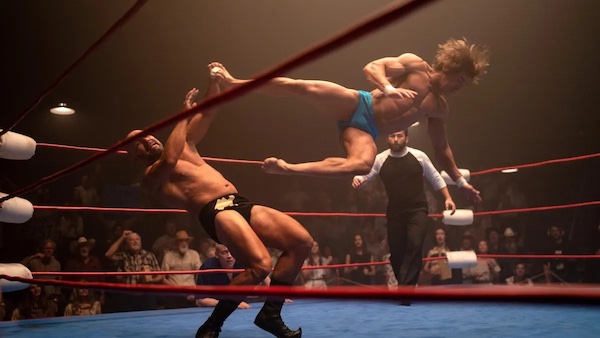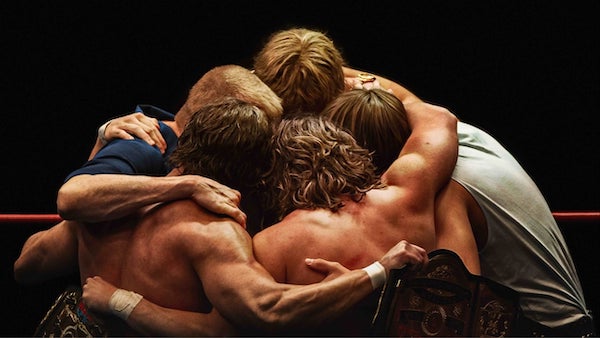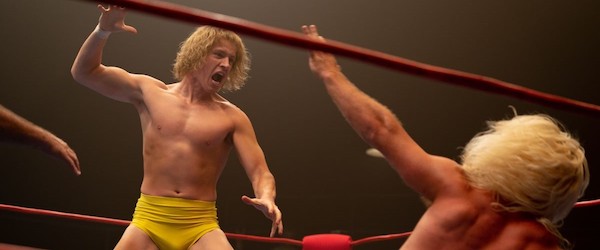Film Review: “The Iron Claw” — In the Clutches of Family
By Betsy Sherman
Writer-director Sean Durkin’s engrossing biopic goes a far piece toward showing the dark side of this tale of patriarchal authority and its abuse under the cover of an all-American, clean-living, unassailable family of heroes.
The Iron Claw, directed by Sean Durkin. Screening at movie houses throughout New England.

A scene from The Iron Claw.
Pay no attention to the tagline on the poster for The Iron Claw: “Sons. Brothers. Champions.” These three nouns barely scratch the surface when recounting the story of Texas pro wrestling’s Von Erich family, who flourished in the ring for a period between the late 1970s and the 1990s. Fortunately, writer-director Sean Durkin’s engrossing biopic goes a far piece toward showing the dark side of this tale of patriarchal authority and its abuse under the cover of an all-American, clean-living, unassailable family of heroes. Meanwhile, the father was putting profits above his progeny’s physical and mental health. A topnotch ensemble cast makes the drama outside the ring hum, and puts the in-ring action over convincingly.
Playing eldest son Kevin Von Erich, Zac Efron may stun on first sight, with his new set of bulging muscles. The physique isn’t all, though; the erstwhile teen idol, often cast as a glib charmer with a megawatt smile, steps out of that lane with a more self-contained turn. Kevin is a taciturn hard worker, both in the ring as a barefoot grappler and at his family’s ranch in Denton County, outside of Dallas. The trauma that he witnesses, and suffers, burrows into him as the years go by.
In a black-and-white prologue set in the early ’60s, Jack Adkisson (an imposingly macho Holt McCallany) looms scarily over the camera in his wrestling persona of Fritz Von Erich. Having hoped for a career in pro football, Jack settled for one in wrestling, during an era of small-time promotions scattered among “territories.” Nationwide coverage by any one promotion was decades away. Adkisson used a family name to brand himself as Nazi heel Fritz Von Erich. His finishing move was the Iron Claw, a hand with fingers spread out and curled, placed on his opponent’s head as if to crush the skull.
On the night depicted, Fritz’s wife Doris (Boston’s own Maura Tierney) and their two young boys Kevin and David meet him in the arena’s parking lot. The couple’s first-born son, Jack Jr., had died in a freak accident at age 6. We learn of Fritz’s dreams and grievances (how he’d been “screwed out of” championship belts).
Jump ahead in time to Fritz having moved from the squared circle into the front office. The promotion he owns, World Class Championship Wrestling, produces live shows and a TV program at Dallas’s Sportatorium. Fritz (still his professional name) and Doris now have a foursome of boys. Pop doesn’t hesitate to say out loud who among them is his favorite, second favorite, etc., or to feed them an us-against-them outlook (“the world keeps takin’ from us”).
The three oldest, Kevin, David (Harris Dickinson from Triangle of Sadness) and Kerry (Jeremy Allen White from TV’s The Bear), played team sports in school. The movie posits Kerry as a possible contender for the 1980 Olympics as a discus thrower. The family watches Jimmy Carter put the kibosh on that, as the president announces the U.S. boycott of the Moscow Olympics. Fritz takes the news worse than anybody. He urges Kerry to join Kevin and David as WCCW wrestlers, and the kid agrees to the plan.

A scene from The Iron Claw.
Durkin deals efficiently with the “is wrestling real?” issue, showing two of the brothers huddling with their opponents, Bruiser Brody and Gino Hernandez, to plan out moves before their match. Later on, Kevin explains some of the behind-the-scenes decision-making.
As Fritz trains the boys with aphorisms about toughness and putting loyalty to the family above all, the three-man Von Erich Brothers team rockets to popularity as babyfaces (good guys) feuding with the entertaining heel team The Fabulous Freebirds. Texas chauvinism is the order of the day, with yellow roses a-plenty. Fritz is the boys’ gruff manager, younger brother Mike something like their mascot. The light-hearted David is the only one who’s good on the microphone and can finesse those rants and taunts known as an “interview” (former NYPD Blue actor Michael Harney is perfect as WCCW play-by-play announcer Bill Mercer).
In this phase of the movie, late bloomer Kevin succumbs to the flirtations of a local fan, Pam (played by Lily James, she’s sharp and vivacious). The movie is structured so that Kevin and Pam’s wedding marks a pinnacle of happiness for the Von Erich boys. In spite of the competitiveness encouraged by Fritz, they really do live for each other.
David is about to go to Japan for a series of championship matches with Ric Flair that, if David wins, would bring a championship belt to WCCW and, more importantly, to the ranch. During the wedding reception, Kevin sees that David has a health issue; he probably shouldn’t make the trip, but both sons know Fritz would never that happen. As the camera pans across the grinning faces of the brothers and Pam line-dancing to John Denver’s Thank God, I’m a Country Boy, it’s like a chapter ending.
Without getting too spoiler-heavy here, The Iron Claw shows the Von Erichs experiencing more than just the usual rough, pain-prone life of the touring wrestler. Collectively, there’s: illness, mutilating injury, drug overdoses, and self-inflicted mayhem. Fritz capitalizes on the fans’ grief. If the locals come out in force for funeral processions (and they do), he bets they’ll turn out for memorial shows.
The repetition of calamities leads to a searing scene that starts with the image of a black dress laid out on a gold-colored bedspread. Doris, preparing for yet another funeral, panics at the sight of it. “Everyone will recognize it,” she says, and wonders if she has to go buy a new one. Pam manages to calm her down.
The movie’s metaphoric iron claw is most apparent when Fritz decides the time has come to give youngest son Mike the push into the Von Erich tag team (in real life, this was a particularly cruel series of events). For the boss, being able to market another Von Erich is more important than the facts: that the skinny young man isn’t physically suited to wrestling, or that Mike wants to be a musician, not a wrestler. When Mike fails to successfully replace his fan-favorite older brother, he feels like he’s letting the crowds and the clan down.

A scene from The Iron Claw.
Another stand-out scene is a makeshift press conference at a hospital in which Mike has had surgery. Kevin informs the reporters, who are hungry for Von Erich news, how it’s a “miracle” that Mike has pulled through and teases that he’ll be back in the ring (a horrifying prospect). Actor Stanley Simons is heartbreaking as the affable kid whose spirit is being snuffed out (believe it or not, there was an even younger Von Erich brother, Chris, who had a tragic story similar to Mike’s, but who was left out of the movie).
Kevin becomes seized by the idea of a family curse. Worried about his and Pam’s first born, a son, he insists on going back to the name Adkisson. He says to Pam about the Von Erich hex: “I don’t want you guys to catch it.” For a time, the two become estranged — this passage is probably the vaguest, and weakest, in the movie.
Overall, the story is conveyed with laudable technical prowess. It’s well shot and edited, with an especially good montage of the brothers’ rise to stardom. Appropriately, Southern and hard rock classics dot the soundtrack (Rush’s Tom Sawyer was Kerry’s theme song). Wrestler Chavo Guerrero did a good job overseeing the wrestling sequences and training the actors.
Along with the fine performances by Efron, Simons, James, and Tierney, Harris Dickinson brings a spark to David, the most buoyant of the brothers, and Jeremy Allen White supplies apt intensity to Kerry, who experiences highs (he was a belt-winner in the WWF) and painful lows. Holt McCallany, as the Texan mogul, gives a strong and fairly restrained performance, radiating emotion more often than exploding with it.
But I wouldn’t have minded some steam coming out of Fritz’s ears, considering the patriarch’s reputation. An internet search on the Von Erichs uncovers that Durkin soft pedaled the story, which is somewhat understandable because it could have turned into overkill. Besides leaving out Chris Von Erich, the wives of the other brothers are gone. Drug arrests that were gotten out of, those aren’t mentioned. And Fritz’s alliance with televangelism, which was making its mark in the ‘80s, doesn’t appear in the film (Doris’s Christian faith is shown to be strong).
Durkin’s first feature was the excellent 2011 Martha Marcy May Marlene, in which a young woman finds an alternative family in a cult, then looks for a way out. Some members of the Von Erich “cult” felt pushed to make an escape so drastic it left them with no future.
Betsy Sherman has written about movies, old and new, for the Boston Globe, Boston Phoenix, and Improper Bostonian, among others. She holds a degree in archives management from Simmons Graduate School of Library and Information Science. When she grows up, she wants to be Barbara Stanwyck.
Tagged: Harris Dickinson, Holt McCallany, Jeremy Allen White, Sean Durkin, The Iron Claw, Von Erich family


I was surprised and elated by how good this film is, how cinematic, and how excellent the ensemble. I’m glad that Betsy Sherman, always a shrewd critic, agrees with me and that she’s taken the time for such a superb, thoughtful review.